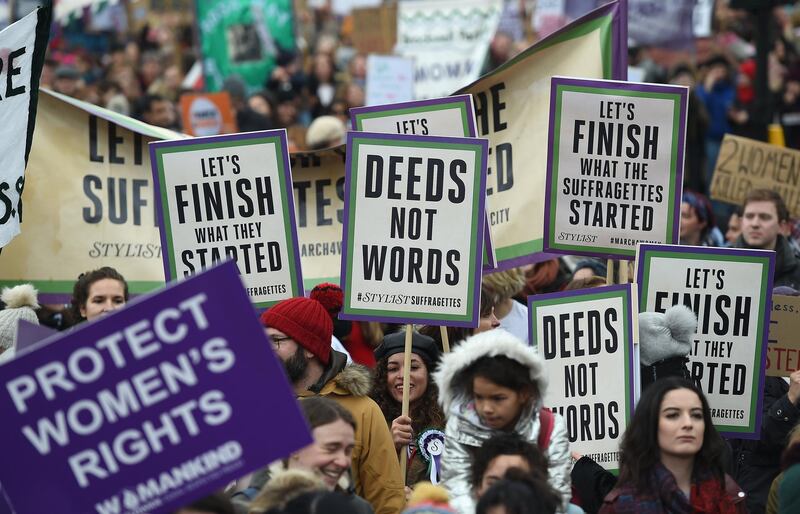Does it all feel too much, all this women's stuff? International Women's Day in the same month as women's history month and following hot on the heels of #TimesUp and #MeToo? I mean, even the United States has very nearly had a female president, and Malala was the youngest person to win a Nobel prize. Isn't the war won and aren't we done here?
The complaints about International Women’s Day come in two opposing flavours, two sides of the same coin. Women have (apparently) achieved everything, so why do we keep banging on about women’s rights? And on the flip side, women are making a fuss about nothing, every day should be women’s day and hey what about the men, why isn’t there an international men’s day to highlight the suffering of men? Hint: there is, in November.
Either way, it’s a refusal to accept that there’s still a long way to go when it comes to women’s ability to live a life of self-determination, freedom, justice and safety. It’s not for fun that women make a fuss, agitate, protest on the streets in the cold, face hostile public abuse or find themselves shot for their activism.
Women globally are far more likely to be illiterate and to live in poverty. They are more likely to face violence and in particular, domestic as well as sexual violence. They are paid less. They are less likely to be influencers in politics and less likely to be on the boards of companies. And to the backdrop of these and so many other statistics, they are far less likely to be able to tell their own stories or to investigate and bring to light these inequalities. They are far less likely to be journalists, authors, politicians, filmmakers, artists, designers, producers, editors or any other position that informs and shapes our thinking. That's not because women can't. And it's certainly not because women don't want to.
_______________
Read more from Opinion
[ When women enter the workforce, health and economic benefits are magnified ]
[ Why Tunisia's new law to end 'all violence' against women is exceptional ]
[ BBC pay row should make us all question what we're worth ]
_______________
Women are just as capable and women are just as passionate and desirous. But for hundreds of years, for millennia, women have simply and straight up been excluded. Some of that exclusion continues to today and is frank and brutal. You simply can't get a seat at the table. You're seen as the object, not the subject. Just ask the women at the Presidents Club.
Some exclusion is far more insidious: "the woman was a weaker candidate" or "her role as a mother meant she wouldn’t be committed, she’s too emotional or too ruthless". Then there's "the male candidate was better known" and "she’s too masculine" or, in fact, "she’s too feminine". And as these contradictions show, there’s always a justification, it’s an excuse, any excuse, which doesn’t even make sense unless you see the bigger picture that despite claims to support balance and justice, there’s deliberate resistance and obfuscation. When action to promote women onto panels, political shortlists or literary prizes are supported, the complaints come: but if women were really the best people they would be getting ahead, what about the poor men? I look at it differently. For thousands of years, the panels were all male, the shortlists were all males, the prizes were all for men.
All that’s being asked for is a redressing of the balance. The process needs to be accelerated. Already parity is predicted to take 200 years. That’s too long. So if you can’t stomach the changes to treat women like actual human beings, then it’s called being comfortable with exclusion, deprivation and inequality. If that’s your position it means you’re okay with women suffering greater poverty, less access to healthcare, of being paid less for the same job, of being in greater fear of sexual assault, of their talent being excluded.
I wish I could agree with both sets of opposition to International Women’s Day because I wish as women we already lived in a world of justice, fairness, safety and recognition. And I also wish that every day was a day where those basic human experiences could be something that women enjoy. In fact, the goal is not to enjoy them as a privilege but to expect them as a right, and to assume that as woman, they are my due. Until that day comes, I’ll be marking International Women’s Day. And male or female, so should you.





